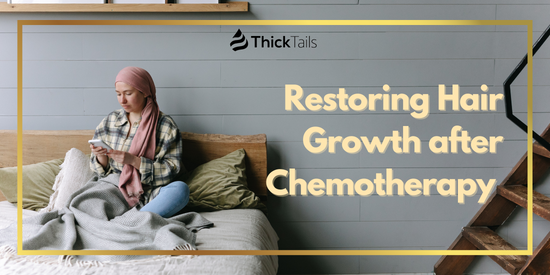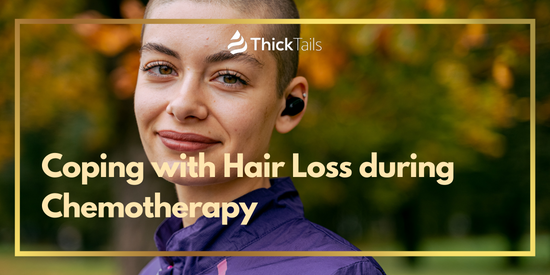Hair loss is one of the most visible and distressing side effects of chemotherapy, affecting countless individuals undergoing cancer treatment. The process of losing and regrowing hair can be a tumultuous and emotional rollercoaster with unique timelines and characteristics for each patient. In this comprehensive guide, we shed light on the intricate process of hair regrowth after chemotherapy, providing a roadmap for what to expect and actionable tips for fostering healthy recovery.
Chemotherapy can strip a patient of more than their health; it often takes their hair, a definitive marker of personal identity. For many, understanding what happens after this loss can be as crucial to their emotional recovery as it is to their physical one. Knowledge empowers, and as the first resilient strands of hair emerge, it's vital to be prepared and informed.
I. Understanding Chemotherapy-Induced Hair Loss

Chemotherapy-induced hair loss is a difficult reality faced by many, but it strikes a particularly poignant chord with women, intertwining with issues of identity, femininity, and personal image. While it’s a universally challenging aspect of cancer treatment, the distinct emotional and social impact it has on women cannot be understated. The path to regrowth and recovery is fraught with complexities; however, understanding the cyclical nature of hair loss and regrowth post-chemotherapy is a crucial step towards reclaiming a sense of self and normalcy.
How Chemotherapy Affects Hair Follicles
Chemotherapy drugs are designed to target rapidly dividing cells, a hallmark sign of cancer and also of hair follicles. This assault on the hair roots is what leads to hair thinning and eventual loss. The specific drugs and dosages play a significant role in how severe this side effect may be for any given patient.
The Emotional Impact of Hair Loss During Chemotherapy
Hair loss, also known as alopecia, can be an emotional trauma. It's a visible and often unforeseen reminder of the disease, which many patients find extremely distressing. Addressing these emotional challenges is a crucial aspect of the overall treatment process.
When Does Hair Loss Typically Occur During Treatment?
Hair loss, or alopecia, usually begins one to three weeks after the start of chemotherapy treatment. Patients may notice hair coming out in clumps during washing or brushing, or shed gradually over several days.
For many women, the extent of hair loss from chemotherapy can vary greatly, ranging from slight thinning to complete baldness. The emotional toll this takes can significantly affect their self-esteem and perception of femininity, making the support from healthcare providers and loved ones critical during this period. Despite the challenges, it's essential to remember that this form of hair loss is typically temporary, with regrowth often beginning once chemotherapy treatments conclude.
II. Hair Regrowth After Chemotherapy: What to Expect
The process of hair regrowth after undergoing chemo can vary widely among individuals, particularly among women who may face added layers of emotional distress due to societal beauty standards. Typically, the first signs of new growth appear within a few weeks to a couple of months after the conclusion of treatment, with the hair possibly returning with a different texture or color initially. This phase can be a deeply personal and pivotal moment, symbolizing a recovery not just from the physical effects of cancer treatment but also beginning the restoration of one’s self-image and confidence post hair loss.
The Timeline of Hair Regrowth After Treatment
Regrowth is a slow and steady process that can last several months. It typically begins a few weeks after the last treatment, with a fine layer of downy hair. Around two to three months post-treatment, this "peach fuzz" gives way to actual hair. The new growth can appear different in texture and color from the hair before treatment. A year after the last chemotherapy session, most patients will have significant hair growth.
Factors That Influence the Speed and Quality of Hair Regrowth
Several factors can influence how quickly and what kind of hair will grow back. These include the type of chemotherapy drugs used, the dosage, the duration of treatment, and the patient's individual genetics and health status.
Tips for Managing Hair During the Regrowth Phase
This is a time of patience, and it's important to be gentle with the hair. Switching to mild shampoos and foregoing harsh chemical treatments is advisable. Being cautious with styling tools and opting for protective hairstyles can help manage the new growth until it's strong and resilient.
III. Supporting Hair Regrowth After Chemotherapy

Taking a proactive approach to hair care post-chemotherapy can make all the difference in your regrowth experience. Here, we explore numerous strategies for fostering robust hair health.
Incorporating the right shampoo and conditioner specifically formulated for post-chemotherapy hair recovery can significantly aid in the gentle care and nourishment needed during this delicate phase. Additionally, certain hair supplements, designed with the unique needs of individuals experiencing hair loss from chemotherapy in mind, may also support stronger and healthier regrowth. These steps are particularly crucial for women, who often face heightened emotional and social challenges related to hair loss.
Hair Care Tips for Promoting Healthy Regrowth
The quest for healthy hair often starts with proper washing and conditioning. Choose cleansing products specifically formulated for sensitive, post-treatment hair. Gently massage the scalp to stimulate blood flow, which carries nutrients to the follicles.
Nutrition and Supplements for Hair Health
A balanced diet is critical for overall health and hair regeneration after chemo. Foods rich in vitamins, minerals, and proteins promote healing and growth. Additionally, supplements like biotin and omega-3 fatty acids have shown potential in supporting regrowth.
Additionally, consulting with a healthcare provider before starting any hair supplements is essential, as they can offer personalized advice tailored to each individual's post-chemotherapy needs. This is particularly important for women dealing with the impacts of hair loss, ensuring they receive support that is both effective and sensitive to their unique circumstances.
Hairstyling and Grooming Tips During the Regrowth Process
Maintaining a positive body image is an integral part of a patient's post-chemo recovery. Simple styling techniques such as using texturizing products and accessorizing can help with the transitional phase, when hair may be at an awkward length or texture.
The Role of Shampoos and Conditioners in Hair Regrowth
Hair care products are not just about cleanliness; they can play a significant role in nurturing your regrowth. Choosing the right shampoo and conditioner can be a game-changer in the quality and sustenance of new hair.
Supplements for Boosting Regrowth
Supplements are a common tool in the regrowth kit for many chemotherapy patients. They serve as concentrated sources of nutrients that can aid in the regrowth process.
While the focus often lies on shampoo and conditioner as foundational elements of hair care, understanding the synergy between these products and hair supplements is essential for those recovering from chemotherapy-induced hair loss, particularly women. These supplements can fill nutritional gaps that might not be met by diet alone, offering an added layer of support to the hair regrowth process. It's a holistic approach that recognizes the need for external and internal nourishment in overcoming the challenges of post-chemotherapy hair recovery.
Nourish Your Temple: Hair-Friendly Nutrition
Another type of supplement exists naturally in food itself. Your diet can significantly affect your hair's ability to regrow. Enrich your meals with a bounty of vitamins and minerals to support a strong and healthy head of hair.
Hairstyling and Grooming Techniques for Emerging Locks
Discovering a new set of hair can feel like starting over. Understanding how to style and care for this young growth is an adventure of experimentation and discovery.
For women undergoing chemotherapy and facing hair loss, finding the right shampoo and conditioner tailored for fragile, regrowing hair is paramount. Alongside these external treatments, incorporating hair supplements can provide the internal support necessary for healthier, stronger regrowth. This multi-faceted approach addresses both the visible and underlying challenges of post-chemotherapy hair recovery.
Patient Stories: The Real Regrowth Journey
Nothing is as informative, comforting, and motivational as hearing from fellow warriors who have been through the same battle. Listening to the tales of others can help guide your expectations and provide solace through the shared experience.
Each story, while unique, underscores a common theme of resilience and hope that resonates with many women undergoing chemotherapy. The tales of overcoming hair loss are not just about the physical regrowth of hair but also about the emotional healing and strengthened spirit. These personal journeys offer invaluable insights and inspiration for those just beginning their path to recovery.
The Emotional Aspect of Regrowth
One's psyche plays a significant role in the process of hair regrowth. Emotional stress can hinder regrowth, which is why addressing the emotional aspect is key to a holistic healing process.
The emotional toll of hair loss on women undergoing chemotherapy cannot be overstated, impacting their self-esteem and sense of identity. It's crucial to create a supportive community where women can share their experiences and strategies for coping with these challenges. Such an environment can significantly alleviate the emotional burden of hair loss, making the regrowth phase less daunting.
Conclusion: The Courage and Patience of Regrowing Hair
The regrowth of hair after chemotherapy requires courage, patience, and a nuanced understanding of the process. Armed with the right knowledge and the support system, you can ensure that each strand that returns is a testament to your resilience. Remember, the regrowth of hair is not just about reclaiming your old look; it's about acknowledging the new person you've become through the challenges you've faced.







